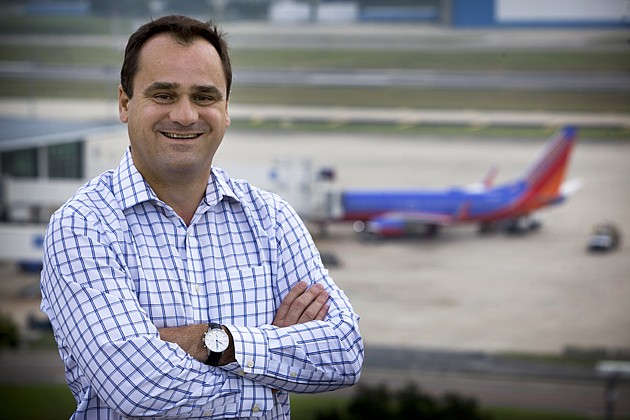- November 25, 2024
-
-
Loading

Loading

It takes a brave soul to charge a fee, in a commodity-based business no less, for a service nearly every competitor has given away free for a decade.
That would make Webjet.com CEO Mathias Friess something of a cunning Gulf Coast pioneer.
Consider: Tampa-based Webjet, a joint venture partnership with Friess and the largest Internet travel site in Australia, under the same name, charges at least $15 for successful searches. Industry giants, firms like Expedia, Orbitz and Travelocity, are free.
“We think we have a great service,” Friess says, “and we think we should charge for that.”
The counterintuitive strategy works. Total tickets sold and hotel stays purchased by WebJet.com customers are close to $100 million this year, says Friess, up 50% from 2011. Friess declines to release specific Webjet revenues, though he says the company does about $5 million to $7 million a year in sales. Webjet has 20 employees, up from eight when it first launched in April 2010, and it recently relocated to a 3,500-square-foot space in a Hyde Park office building in Tampa.
Webjet is essentially a technology business that looks like a travel agency call center. A user will log on to Webjet.com, and can book flights hotels and cars for trips worldwide. The site bills itself as a virtual, real-time travel agent, one that's independent of all airlines and will always show the cheapest fares available.
The backbone of the system, however, is its proprietary technology, run by programmers out of an office in Detroit. The idea, says Friess, is to have an online system customers find fast and efficient, but not one that's a wasteland of promotions and up-sells. “It has to be as simple as possible,” Friess says. “We are not into cross-selling until the cows come home.”
Most of the company's sales, so far, are from booking foreign trips, for Americans to go abroad. That's less competitive than straight-up domestic searches, Friess says, and a growth in passports issued has led to more international travel. Says Friess: “We believe (international travel) is a space left on the side by others.”
But Friess now intends to extend Webjet's reach, with a domestic-focused search component. The company has spent the past year developing the technology, and will launch it later this fall. “We want to make sure if we go on the highway with this,” says Friess, “the wheels won't fall off.”
Friess projects Webjet's sales will double within a year, when the domestic search service is up and running. That will likely lead to hiring at least four more employees, he says. The firm, moreover, recently added a travel site for Canadians, and plans to get another site up for Mexico later this year. A service for travel packages, says Friess, is also forthcoming.
Friess was born in Germany. He turned a boyhood fascination with wanting to become a pilot into a career in airlines. He worked in the North American sales division for Lufthansa, the German airline, and he later worked for Virgin Blue, a low-cost Australian startup airline founded by billionaire entrepreneur Richard Branson.
Webjet's Australian executives approached Friess in 2009 about launching an American version of the company. Friess took the chance, and soon settled on Tampa. He had one big family reason: His wife grew up in the area.
Still, Friess is effusive in his praise of business support on the Gulf Coast. He looked into the Northeast, but decided salaries were too high to make a call center work. He considered California and Oregon, but balked at high taxes and overpriced real estate. “You can't beat Florida for starting a business,” Friess says.
The biggest challenge now, says Friess, is to make sure Webjet's technology changes fast enough to meet demand from consumers in what can be an emotional purchase. That, in turn, can makes customers moving targets. Friess hopes to hit enough targets to continue riding Webjet's growth.
“I'm passionate about travel,” Friess says. “And I'm passionate about making travel fun for others who love to travel.”
Sir Richard
Mathias Friess, CEO of Tampa-based Webjet, an online travel firm, once worked for famed British entrepreneur and airline industry mogul Richard Branson.
Friess worked with Branson at Virgin Australia, a fast-growing, low-cost airline. Says Friess: “Getting to know Branson and working closely with him has probably been a key driver in my decision to eventually start my own business.”
Friess says Branson preached, and practiced, the idea that a successful company requires leaders who are driven, enjoy work and can have fun. Friess says another key lesson he learned from Branson is mistakes make a company better.
“Any business that doesn't make mistakes is missing out on opportunities and isn't evolving,” says Friess. “(It) runs the risk of becoming stale due to lack of innovation, and is probably eventually not fast enough in speed to market. Encourage staff to make decisions and fall on their face now and then.”
Adds Friess: “Just make sure it's never the same mistake twice.”